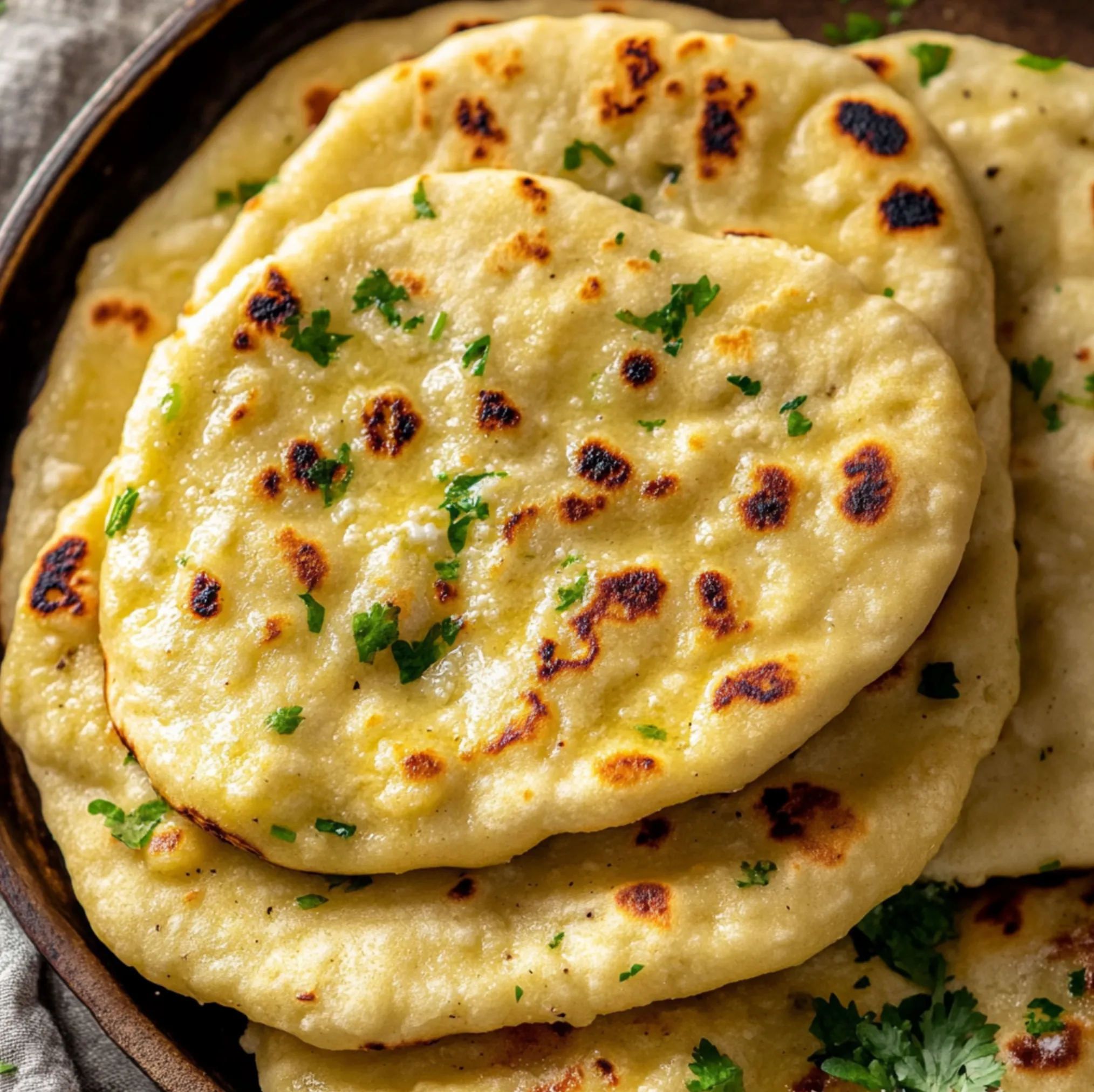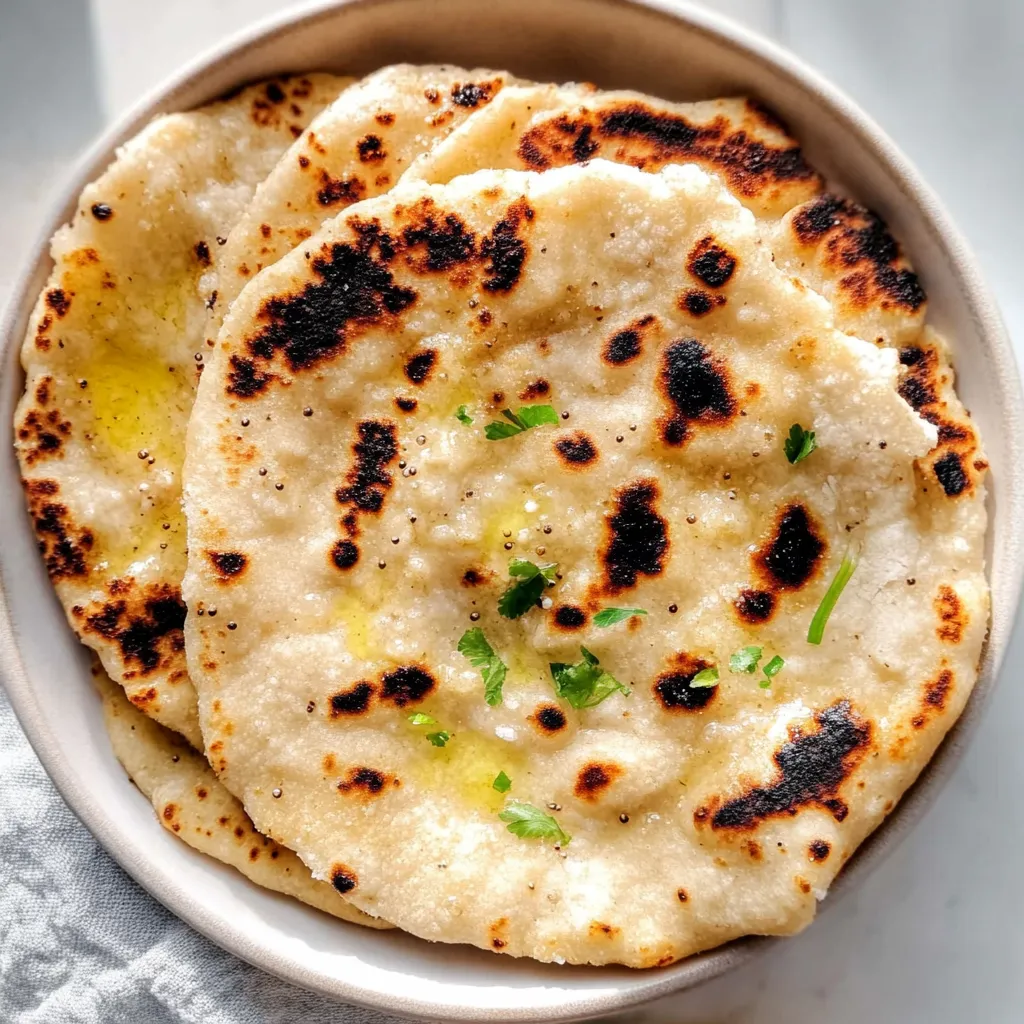 Pin it
Pin it
This gluten-free naan bread delivers an incredibly soft, pillowy texture with just the right amount of chewiness—exactly like traditional naan but without any gluten or yeast. Ready in just 45 minutes using baking powder instead of yeast, this recipe produces naan that puffs up beautifully during cooking, creating those characteristic bubbles and charred spots that make naan so irresistible. The dough is remarkably easy to work with thanks to psyllium husk, allowing you to knead and roll it without the common challenges of gluten-free baking.
This recipe came about after countless requests from readers, and I spent weeks testing and perfecting it. The breakthrough came when I discovered the exact ratio of millet flour to tapioca starch needed for the perfect texture. Now it's become my go-to naan recipe that I make weekly because everyone—even non-gluten-free family members—absolutely loves it!
Ingredients That Make All The Difference
- Millet flour and tapioca starch: This specific ratio creates the perfect structure without gumminess. Using more millet flour than tapioca starch is the key to achieving authentic naan texture.
- Psyllium husk: Acts as a gluten substitute, making the dough pliable and allowing it to puff up properly. This cannot be substituted.
- Yogurt: Adds tanginess while contributing to the characteristic texture. Either plain or Greek style works beautifully.
- Baking powder: Replaces yeast for quick leavening while still achieving the soft, puffy texture.
- Sugar: Not enough to make it sweet, but helps with browning and balances flavors.
Step-by-Step Instructions
- Begin by preparing your ingredients properly:
- Weigh all ingredients using a digital scale for accuracy—this is especially important in gluten-free baking where small variations can significantly affect results. Make sure your yogurt is at room temperature and your psyllium husk is fresh and not expired.
- In a large mixing bowl:
- whisk together the dry ingredients: millet flour, tapioca starch, sugar, salt, and baking powder. Ensure everything is thoroughly combined with no clumps of baking powder remaining. This even distribution is crucial for uniform rising during cooking.
- Create the psyllium gel:
- by mixing the psyllium husk with warm water in a separate bowl. Stir quickly and thoroughly—the mixture will form a gel within 15-30 seconds. Don't worry if it seems thick; this gel is what gives the naan its pliable texture and helps it puff up during cooking.
- Add the yogurt and olive oil:
- to the psyllium gel, mixing until fully incorporated. The mixture should be smooth with no lumps of yogurt remaining. Pour this wet mixture into the bowl with the dry ingredients.
- Using a wooden spoon or rubber spatula:
- mix everything together until you have a very shaggy dough with most of the flour hydrated. Then switch to using your hands, squeezing and kneading the dough to incorporate any remaining dry patches. The dough should come away from the sides of the bowl and feel springy but not sticky.
- Once the dough is fully combined:
- shape it into a ball and place it on a lightly floured surface. Divide the dough into 8 equal portions (about 110g each if using a scale). Shape each portion into a ball, covering them with a clean dish towel to prevent drying.
- To roll out each naan:
- place a dough ball on a lightly floured surface and dust the top with additional flour. Using a rolling pin, roll into a circle or oval shape about 7-8 inches in diameter and ⅛-¼ inch thick. Rotate frequently while rolling and add flour as needed to prevent sticking.
- Stack the rolled naan:
- between pieces of parchment paper and cover with a dish towel until ready to cook. This prevents them from drying out or sticking together while you finish rolling all the portions.
- Heat a cast iron skillet or non-stick pan:
- over medium-high to high heat until very hot. Test by sprinkling a few drops of water—they should sizzle and evaporate immediately. Place one naan in the dry pan (no oil needed) and cook for 1-2 minutes until bubbles form on top and the underside is golden with charred spots.
- Flip the naan:
- and cook for another 1 minute or until the bubbles create golden-brown charred spots. Immediately brush the hot naan with melted butter or ghee mixed with chopped cilantro or parsley if desired. Keep cooked naan warm by wrapping in a clean dish towel while finishing the rest.
 Pin it
Pin it
I learned the hard way about flour ratios after my first attempt with a store-bought gluten-free blend resulted in gummy, undercooked naan. Once I switched to the specific millet and tapioca starch ratio, the texture transformed completely—proving that sometimes the simplest combinations work best in gluten-free baking.
Troubleshooting Common Issues
If your naan isn't puffing up properly, several factors could be at play. Rolling too thin or too thick prevents proper puffing—aim for ⅛-¼ inch thickness. Insufficient heat is another common issue; the pan must be properly preheated for the baking powder to activate and create steam bubbles. If the dough seems too dry, add water one tablespoon at a time until you achieve the right consistency.
Storage and Reheating
These naan are best enjoyed fresh, but they keep remarkably well. Store in an airtight container for 2-3 days at room temperature. To restore their soft texture, reheat in the microwave for 30-45 seconds, or on the stovetop with a light water spray and covered pan. For reheating multiple naan, use the oven with a light water spray to prevent drying.
Serving Suggestions
These gluten-free naan are perfect alongside curries, stews, or as a base for personal pizzas. Try them with butter chicken, saag paneer, or chickpea masala. They're also excellent for wraps or as a side to soups and salads. For a simple snack, serve warm with hummus or your favorite dips.
I've come to treasure this recipe not just for its incredible results, but for how it's made gluten-free Indian cuisine accessible to so many people. There's something deeply satisfying about creating a recipe that bridges dietary restrictions with authentic flavors. Whether you're gluten-free or not, these naan prove that dietary limitations don't have to mean compromising on taste or texture.
Frequently Asked Questions
- → Can I make this naan without psyllium husk?
- Psyllium husk is essential for the structure and flexibility of this gluten free naan. Without it, the naan won't be soft and pliable.
- → Why isn't my naan bread puffing up?
- Make sure your naan is between ⅛-¼ inch thick, your pan is hot enough, and the dough isn't too dry. Too thick or thin naans won't puff properly.
- → How do I store leftover naan?
- Store in an airtight container for 2-3 days. Reheat in microwave, stovetop with lid, or oven with a sprinkle of water.
- → Can I freeze this gluten free naan?
- Yes, cool completely and freeze for up to 3 months. Reheat from frozen in a hot pan or microwave.
- → What can I use instead of millet flour?
- You can substitute with sorghum flour, corn flour, light buckwheat flour, or white teff flour. Add 3-4 tablespoons extra water when using these.
